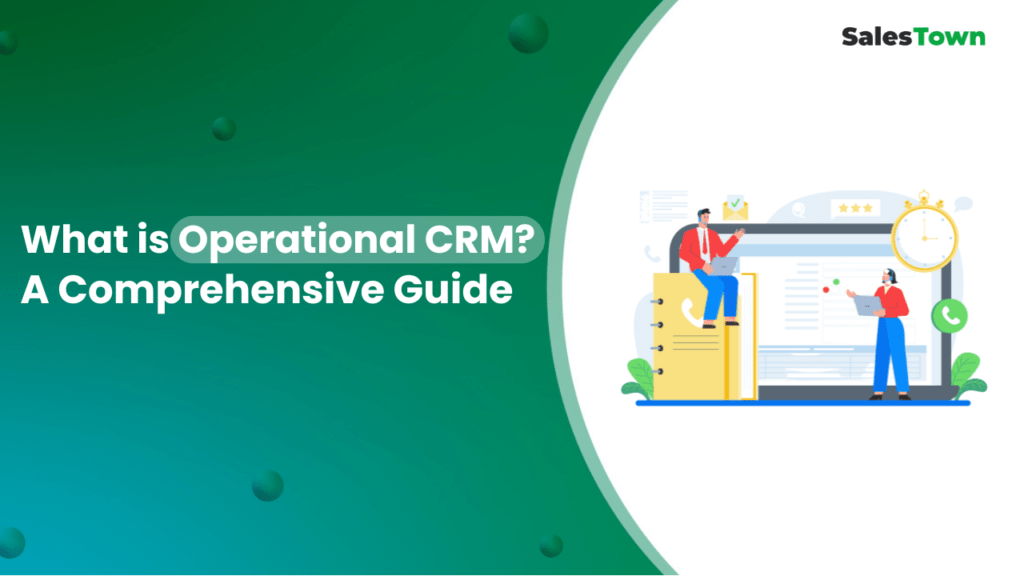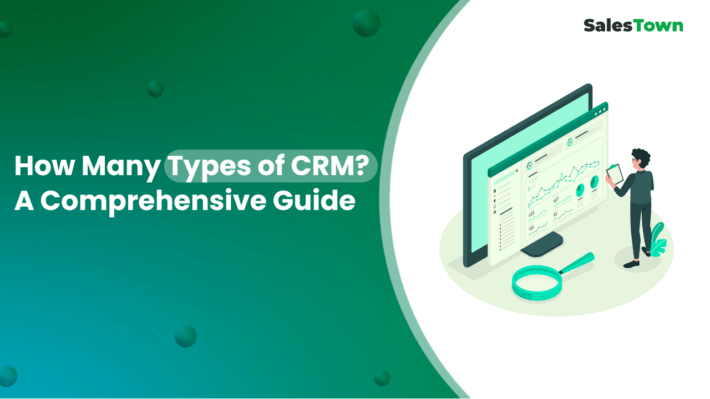What Is Operational CRM? Explained Simply

In today’s fast-paced business environment, managing customer relationships is crucial for success. One powerful tool that helps companies streamline their customer-facing operations is Operational Customer Relationship Management (CRM). This blog post will dive deep into the world of Operational CRM, exploring its features, benefits, and how it can transform your business processes.
What is Operational CRM?
Operational CRM is a system businesses use to manage their everyday interactions with customers. It helps automate tasks in sales, marketing, and customer service to make processes faster and more efficient.
In simple terms, it helps businesses keep track of their customer information, manage communication, and improve customer service. This makes it easier for companies to provide a better experience to their customers and handle routine tasks without much effort.
By using an Operational CRM system, businesses can improve customer relationships, save time, and increase efficiency in their day-to-day operations.
👉 Read Also:What is Analytical CRM?
How Does Operational CRM Differ from Other Types of CRM?
To better understand Operational CRM, it’s essential to differentiate it from other types of CRM systems:
- Analytical CRM: Focuses on analyzing customer data to gain insights and make informed decisions.
- Collaborative CRM: Emphasizes communication and collaboration between different departments and external stakeholders.
- Strategic CRM: Concentrates on long-term customer relationship strategies and overall business objectives.
While Operational CRM may incorporate elements of these other types, its primary focus is on optimizing day-to-day customer interactions and processes.
What Are the Key Features of Operational CRM?
Operational CRM systems typically include a wide range of features designed to support various business functions. Here are some of the key features you can expect to find in a robust Operational CRM like Salestown CRM:

Let’s explore each of these features in more detail.
1. What is Contact Management?
- Definition: Contact management helps businesses store and organize customer details, such as names, phone numbers, emails, and past interactions.
- How it works: You can easily access a customer’s information in one place and track all communications, making it easier to manage relationships.
- Benefit: It ensures that all customer data is up-to-date, helping sales and support teams to personalize their interactions.
2. What is Sales Automation?
- Definition: Sales automation refers to automating repetitive tasks in the sales process, like follow-up emails, meeting reminders, and lead tracking.
- How it works: The system automatically sends follow-ups, schedules calls, or reminds the team to engage with leads, saving time and reducing manual errors.
- Benefit: It streamlines the sales process, helping salespeople focus on closing deals rather than managing administrative tasks.
3. How to Use Marketing Automation?
- Definition: Marketing automation allows businesses to create, schedule, and send marketing campaigns automatically based on user behavior.
- How it works: By setting up rules and triggers, you can send targeted emails or offers to the right audience at the right time, increasing the chances of engagement.
- Benefit: It saves time and effort while ensuring consistent communication with customers, helping to nurture leads and convert them into customers.
4. How Does Service Automation Help?
- Definition: Service automation improves customer service by managing customer requests, complaints, and feedback more efficiently.
- How it works: It automates tasks like ticketing, case tracking, and assigning support agents, making the customer support process smoother.
- Benefit: Faster response times and improved customer satisfaction, as the system ensures no customer query is left unattended.
5. What is Lead Management?
- Definition: Lead management tracks and organizes potential customers (leads) through the sales funnel, from the first contact to a successful sale.
- How it works: The CRM assigns and tracks leads, ensuring follow-up actions are taken at the right time to nurture them toward conversion.
- Benefit: It ensures that no lead is lost and helps sales teams prioritize their efforts based on the potential value of the lead.
6. How to Use Customer Data Analytics?
- Definition: Customer data analytics analyzes customer data to provide insights into customer behavior, preferences, and trends.
- How it works: The CRM collects data from various touchpoints and processes it to give actionable insights, like which products customers are interested in.
- Benefit: It helps businesses make informed decisions and tailor their marketing and sales efforts to individual customers.
7. What is Task Management in CRM?
- Definition: Task management helps teams organize, assign, and track tasks to ensure smooth project execution.
- How it works: You can assign tasks to team members, set deadlines, and track progress, ensuring that every task is completed on time.
- Benefit: It improves team coordination, productivity, and accountability by keeping everyone on the same page.
8. How Do Reporting & Dashboards Help?
- Definition: Reporting and dashboards provide visual summaries and detailed reports on sales, marketing, and customer service performance.
- How it works: CRM systems generate reports on key metrics, showing trends and areas that need improvement.
- Benefit: Businesses can make data-driven decisions by reviewing the performance of various departments and adjusting strategies accordingly.
What Are the Benefits of Implementing Operational CRM?
Implementing an Operational CRM like SalesTown CRM can provide numerous benefits to businesses of all sizes:
Benefits of Operational CRM
Now that we’ve looked at the key features of Operational CRM, let’s explore some of the benefits it offers to businesses:
1. Improved Customer Experience
One of the main benefits of Operational CRM is that it enhances the customer experience. By automating routine tasks, businesses can provide faster and more personalized service. Whether it’s sending a targeted marketing email, following up on a sales lead, or resolving a customer support issue, Operational CRM ensures that customers feel valued and cared for.
A better customer experience leads to higher customer satisfaction, which in turn leads to increased loyalty and repeat business.
2. Increased Efficiency
Operational CRM automates many tasks that would otherwise be time-consuming and repetitive. Sales teams don’t have to manually track leads, marketing teams don’t have to send individual emails, and customer service teams don’t have to respond to every inquiry manually. This increases overall efficiency and frees up employees to focus on more strategic activities.
By streamlining processes, Operational CRM helps businesses run more smoothly and handle more customers without increasing overhead costs.
3. Better Collaboration
Operational CRM systems provide a centralized location for customer data, making it easier for different teams—sales, marketing, and customer service—to collaborate effectively. When everyone has access to the same customer information, teams can work together more seamlessly and ensure that customers receive consistent, high-quality service.
4. Better Decision-Making
The reporting and analytics features of Operational CRM provide businesses with valuable insights into their customer interactions. This data helps businesses understand what’s working and what needs improvement. For example, businesses can track which marketing campaigns are most successful or which sales strategies lead to the most conversions.
By using data to make decisions, businesses can improve their overall performance and better meet the needs of their customers.
5. Cost Savings
While implementing a CRM system requires an investment, Operational CRM can help businesses save money in the long run by increasing efficiency, reducing errors, and improving customer retention. By automating routine tasks, businesses can reduce labor costs and improve their bottom line.
How to Choose the Right Operational CRM for Your Business?
Selecting the right Operational CRM for your business is crucial for maximizing its benefits. Here are some factors to consider when evaluating CRM solutions:
- Scalability: Can the CRM grow with your business?
- Customization: Does it offer the flexibility to adapt to your specific needs?
- Integration: Can it integrate with your existing tools and systems?
- User-friendliness: Is it easy for your team to learn and use?
- Mobile capabilities: Does it offer robust mobile access?
- Support and training: What kind of support and resources are available?
- Security: How does the CRM protect your sensitive data?
- Cost: Does it offer good value for money?
- Implementation time: How long will it take to get up and running?
- Industry-specific features: Does it cater to the unique needs of your industry?
Why Choose Salestown CRM as Your Operational CRM Solution?
Salestown CRM is a comprehensive Operational CRM solution designed to help businesses of all sizes optimize their customer-facing operations. With its robust feature set, user-friendly interface, and scalable architecture, Salestown CRM offers:
- A complete suite of sales, marketing, and customer service tools
- Customizable workflows to match your unique business processes
- Advanced reporting and analytics capabilities
- Seamless integration with popular business applications
- Mobile access for on-the-go productivity
- Top-notch security to protect your valuable data
- Excellent customer support and training resources
- Competitive pricing options to suit various budgets
By choosing Salestown CRM as your Operational CRM solution, you can streamline your business processes, improve customer relationships, and drive growth in today’s competitive marketplace.
Embracing Operational CRM for Business Success
Operational CRM is a powerful tool that can transform the way businesses interact with their customers. By centralizing customer data, automating routine tasks, and providing valuable insights, Operational CRM enables companies to deliver exceptional customer experiences while improving efficiency and driving growth.
As you consider implementing an Operational CRM solution like Salestown CRM, remember that success depends not just on the technology itself, but also on how well it’s integrated into your business processes and adopted by your team. With the right approach and a commitment to leveraging its capabilities, Operational CRM can become a cornerstone of your business success strategy.
Are you ready to take your customer relationships to the next level? Explore how Salestown CRM can help your business thrive in today’s competitive landscape.
FAQ (Frequently Asked Questions)
Q1. What is Operational CRM?
Ans. Operational CRM is a type of Customer Relationship Management software that helps businesses manage day-to-day operations like sales, marketing, and customer service. It focuses on automating processes to improve efficiency and customer interactions.
Q2. How does Operational CRM work?
Ans. Operational CRM works by automating key business processes, such as managing customer data, tracking interactions, and providing tools for sales and customer support teams. It helps streamline operations and improve customer experiences.
Q3. What are the benefits of using Operational CRM?
Ans. Benefits include improved customer service, streamlined sales processes, better marketing campaigns, and enhanced customer satisfaction. It helps businesses manage customer relationships more effectively by automating repetitive tasks.
Q4. Who should use Operational CRM?
Ans. Any business that interacts with customers can benefit from Operational CRM. It’s ideal for companies looking to automate sales, marketing, and customer service processes to enhance efficiency and customer satisfaction.

